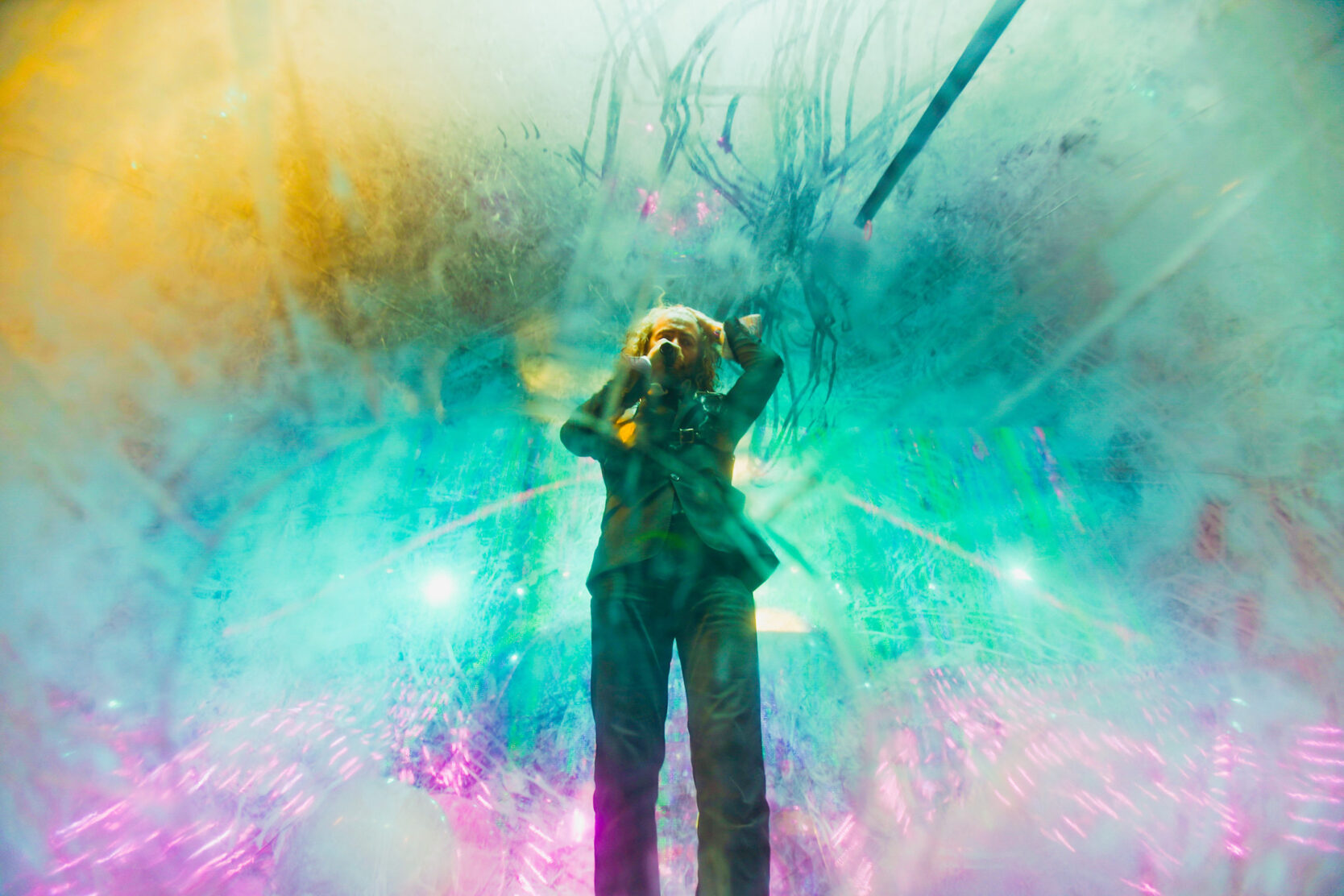The Christmas season, with its outsized themes of transformative cheer and trippy imagery of bearded dudes flying with reindeers through snowy skies, fittingly looms large in Flaming Lips lore. The Oklahoma psych-rock kings have used the holiday as inspiration for numerous songs (“Christmas at the Zoo”), an instrumental album (Atlas Eets Christmas, recorded under the alias Imagene Peise), and an entire goddamn feature film (Christmas on Mars).
So it’s only natural that Wayne Coyne, the band’s eternally youthful frontman and ringleader, has his digs looking pretty festive. “We almost got the place decorated, as you can see,” he says over Zoom from his living room in Oklahoma City, battling the background din of his “two crazy little kids” running around. Multiple decorated trees are visible, including one small, silver one.
“Good times!” he cackles, seemingly with a sense of relief. Coyne, who co-founded The Flaming Lips in 1983, has earned the right to take a deep breath and review another whirlwind year. The most immediate subject: finally properly touring behind their 2020 LP, American Head.
“We started playing shows last November, so it’s felt like a year of ‘Is this all going to keep happening?'” he says. “At the end of last April, beginning of May, we had to cancel some shows because I caught COVID. As it turned out, a couple of the other guys had it as well. Come the end of February 2023, we will have finally made up all those shows we missed. So in a way, that will end the chapter of the American Head tour that could never get started and then could never finish.”
It feels like The Flaming Lips are entering some kind of new era — one, notably, without co-founding bassist Michael Ivins, who quietly left the band in 2021. (Coyne says the split was best for everyone: “There was no drama. There was no one moment.”) In another chapter-closing move, the band has also emptied the vaults for their beloved 2002 LP, Yoshimi Battles the Pink Robots, issuing a massive box set with B-sides, demos, and live cuts.
And it’s crucial to note the band’s lack of studio output since American Head: Outside of a few side projects and detours — backing then-14-year-old fan Nell Smith on an album of Nick Cave covers, releasing tracks for a birdsong compilation and a Spongebob movie — they’ve been unusually, yet intentionally, more focused.
“By the time we finished American Head, [multi-instrumentalist] Steven [Drozd] and I sort of decided, ‘Let’s not make too many fast records in a row,'” Coyne says. “If I go back to even 2014, we did Flaming Lips records, these offshoot records like the Sgt. Pepper’s [tribute album, 2014’s With a Little Help From My Fwends], the Miley Cyrus records. Those are exhilarating at the time. I think we got that out of our system. Steven and I wanted to be in the thick of it, where we could just be involved in a lot of music and be consumed by it. That’s the only way you can learn and evolve — otherwise, you’re never able to know what you’re doing. We made a lot of music, and a lot of it we loved, and a lot of it was in a hurry, and a lot of it was like, “What the fuck were we thinking?”
In early December, Coyne took a break from his pre-Christmas break to review the Year in Lips. Along the way, we talked about the now-famous space bubble shows, his revealing “Do You Realize??” four-track demo, the fiber-optic Jesus that Jack White gave him, Thom Yorke‘s band The Smile, and when we might hear some new music.

SPIN: It’s been an interesting stretch of touring: space bubbles, cancellations, playing in a cave near Chattanooga. How do you feel about it all?
Wayne Coyne: Every show has been a complete blowout, with people just losing their minds. I think our shows have gotten better and better. There’s a big venue in [Oklahoma City, The Criterion] where we did the space bubble concerts. We were there for almost that whole year of COVID: setting up and rehearsing our shows and the front-of-house mixes and video mixes. We didn’t realize how much work we were able to catch up on. Always being on tour is a motherfucker because you’re always on the go and always fixing equipment. The way we do stuff, a lot of times our equipment is in a truck somewhere and we’re gonna be getting there the day before. We’re lucky if it all works. Whereas this was day after day, week after week of just working on sounds and little nuances and all the boring stuff that we’d just never had a second to fuck with. It just made our shows more dynamic, more precise — with more that people can get involved in.
I’m obsessed with this Yoshimi reissue. It’s disarming to hear you strumming through a raw early take of “Do You Realize??,” without the embellished chords and harmonies that Steven brought later on. Comparing it to the final product, it highlights the balance you two achieve: you with a more big-picture vision, Steven with a more nuanced musical vision.
I have to say, for as beautiful as the song ends up being now, and meaning what it means, you couldn’t really have found a clunkier demo to show everybody. Some of the demos of our songs are a lot better. [Laughs.] But it just goes to show you that this essence, this expression — whatever it is, it’s very difficult to capture. Most songwriters will talk about that: the magic that’s flowing through you or whatever. If you get that, it doesn’t mean the work is over. But the way that we were working on the Yoshimi record, [producer] Dave Fridmann was firing on all cylinders and so was Steven, and we were really moving. Things were sounding great. We really had a confidence that we could make it work.
You don’t need that much. With “Do You Realize??,” I could tell Steven and Dave Fridmann were excited. That kind of gives you confidence to go for it and try things. I’m hesitant to make it seem like it’s all about the song and lyrics and stuff like that. I love every millisecond of recording and making our music, but especially with the things I’m doing, it’s like, “Let’s get on with the way the cowbell is going to sound.” [Laughs.] But I understand that [essence] is what Steven was hearing, what Dave Fridmann was hearing, what the audience is hearing — the way this message is getting across. If the song hadn’t been received as well as it has been, I probably wouldn’t be as brave with those demos as I am now. I can say, “See how it started? Isn’t it great now?”
“Assassination of the Sun” might be one of the most beautiful Flaming Lips songs. It’s still wild to me that you guys ended up cutting it from Yoshimi. When you went back through the archives, did you find anything that surprised you or made you think of the album in a new way?
It usually takes us about five years to be like “Fuck, we had no idea what we were doing.” It just shows you that when it works right, it’s a mystery as well. In our defense, I think by the end of the Yoshimi [sessions], the stuff that even came out after Yoshimi, like the song you’re talking about, we’d been working at Dave Fridmann’s studio since 1997 — that would have been Zaireeka, The Soft Bulletin, and Yoshimi. It comes pretty quickly. It was a pretty intense five years or whatever. And I think by the end of doing the Yoshimi record, we were just sick of songs. We’d gotten to where we had some really good ones, although they weren’t giving us the thrill anymore. That would have been one of them — half of us were like, “That’s such a great song.” And the other half were like, “I know, but I’m sick of [songs]. [Laughs.] It’s pathetic.
I make it a promise to the gods of music. “If you give me a good song, I’ll work until my death to make that work.” But you don’t always know what you’re gonna do with them and how much time you’ll have. There are a lot of factors. But there are songs on our records where you’re like “You put that on there but didn’t put that on there?” But you also just don’t take it all that seriously. We like having everybody chime in and say “Here’s what I think,” but there are times when we don’t want to be influenced by what everybody thinks. We just want to bravely say “This is what we want to do.” In hindsight, I definitely regret it. But in the moment, if we haven’t done what we want to do, we would have regretted it. It’s like we say in our songs all the time: “You’re fucked if you do; you’re fucked if you don’t.” You’ve gotta go with the thing you really love right now. And you hope you get lucky.
This reissue made me remember how much I love “Thank You Jack White.”
Me too! Me too! [Laughs.]
It’s so funny and casually catchy and very Flaming Lips in how absurd of a scenario it documents. Of course Jack White gave you a fiber-optic Jesus. Do you still have it? Has any other musician given you a gift that’s managed to top it?
I probably have it. I’m in a giant house, and people have moved in upstairs, and we would have moved storage around. The fiber-optic Jesus came back [with me] from that tour — we were on tour with Beck in 2002, so this was a long time ago. I plugged it in, and it was on the mantle in my living room, and it stopped working after about a year. Then I looked, and there was a sticker on the bottom that said, “Do not leave turned on for more than eight hours at a time,” and I’d literally plugged it in and left it turned on for more than a year. [Laughs.] We’d come up with the song, and after I had that song and people heard it, people would give me a lot of things like the fiber-optic Jesus. It’s like your aunt who knows you like elephants, so she’ll give you an elephant painting for the rest of your life.
Just a constant barrage of Jesuses.
[Laughs.] Yeah! So I would get a lot of stuff like that. I’m sure I have it somewhere because I have everything I’ve ever had. I’m not a hoarder. I always say, “Hey, it’s cool stuff. I just don’t like throwing things away.” We have a song we sing when we have a dilemma like that [sings in a very sweet, childlike tone]: “Maybe this is trash / Maybe this is trash.” We had to throw away a big screen TV the other day because it had a glitch in it. It was perfectly expensive and good, but we got a new one. TVs are like $400 now — you get a TV the size of your fucking garage. The fiber-optic Jesus, I’m sure I would have put it somewhere, like “I’ve gotta keep this because we’re gonna be talking about this 20 years from now.” The way I keep things, I have no fucking idea where it is. I’m sure I’ll stumble upon it some time.
It’s year-end list season, so I had to ask about what you’ve been listening to. My favorite album this year is the debut from The Smile, the new band with Radiohead’s Thom Yorke and Jonny Greenwood. Did you check that out?
Yeah, yeah! I don’t know all of it. I heard the first two or three things they put out in advance of it and stuff. If you’d told me it was Radiohead, I would have said, “Of course it is.” It doesn’t sound like it’s off on a different tangent from Radiohead or Atoms for Peace or the Thom solo stuff. It’s of the same shade. I love that they’re called — it’s The Smile, right?
Yes.
Atoms for Peace — all those fucking great names. Of all the names, I’ve always thought Radiohead is one of the worst names ever. It ranks up there with The Beatles and The Flaming Lips. [Laughs.] I feel like Thom and Johnny were like, “Let’s do it again. Let’s call our band The Smile.” I love it. I don’t get to play it enough because we have a couple little kids. Eventually I will. I still want to see them — they’re on tour right now. They’re always top-notch. It’s always amazing.
Any other interesting music you’ve discovered this year?
I wouldn’t even remember what came out this year. If I’m lucky, I’ll get maybe two hours [for an] Alexa or Google or Spotify run where I’ll say something like “Alexa, play Animal Collective,” and it’ll play some things you’re familiar with and then go off on a tangent. I have a phone but don’t have a computer right there with me. It could be Animal Collective or a group that sounds like them that’s on the same trip. I’ve heard so many things where I wish I had some electronic assistant that said “This is what that was.” The same would be true to listening to Portishead or something. You listen to 45 minutes of Portishead and suddenly you’re into something [new]. There are tons of things I’ve heard, but I’ve not been able to keep up with it or know what it was.
Finally, since you’re finally approaching the end of the American Head era, what’s the status on new music? Do you have anything in the works?
Not too much. American Head was a big record too. There are a lot of songs on that. That was already an accumulation of three years of picking and choosing which songs were gonna work and all that. Once we knew that that record was done and was gonna work, we said “Let’s not make a record for a couple years and not worry about it too much. Let’s see if we can sort out what The Flaming Lips are now.” I think that’s where American Head dropped us off: “Now you’re this kind of band.” And we’re like, “Finally! Cool!” And that seemed like a good spot.
We definitely always have songs and bits floating around but no great momentum to turn it into something that would come out a year from now or something. It’s funny how things can happen and you get inspired, but I think we made a hard choice to not make something in a hurry just so we have more music. Dave Fridmann urged us in that same way. Without regretting the clusterfuck of all the stuff we did, we’ve reached the point where we can pick what we want to work on, work hard on it, and give it everything we have. I think on some of the stuff we did, like the stuff we did with Miley, we wanted another six months to work on it. You don’t get it. It’s just the way scheduling and all that shit works. It’s frustrating when you see these things that could bend a different way. So I guess the answer [to your question] is “not too much.” [Laughs.]
I’m sure we won’t have to wait too long.
We also have such a big catalog that we always neglect. People ask us about songs, and Steven and I will be like, “I swear to God, I don’t remember that song at all.” It’s like that song you mentioned, “The Assassination of the Sun” — we love that people have given their time and energy and part of their soul to listen to that, to let it become part of their lives. I think we thought, “We should make that important to us too. We should be a little less consumed with who we are now and more aware of what we’ve been and what that means to people.”





